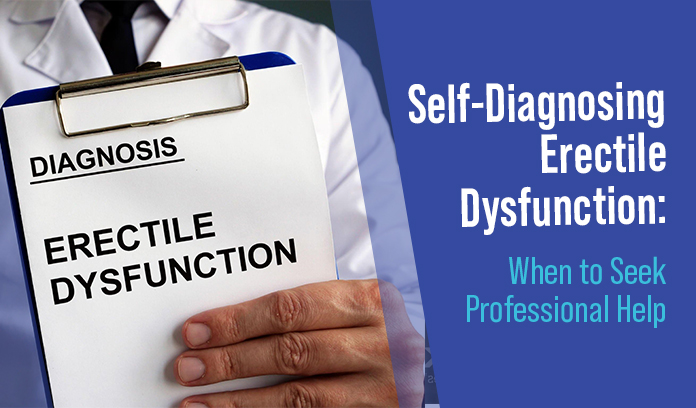Understanding Erectile Dysfunction
An inability to get or maintain an erection firm enough for sexual activity refers to erectile dysfunction. It may become apparent as a result of a variety of physical or psychological factors, including stress, anxiety, relationship issues, chronic illness, or hormonal imbalances. While it is natural for most men to experience occasional difficulties, consistent challenges may need attention.
Self-Diagnosing Erectile Dysfunction
The internet has provided access to numerious information on health-related topics, including erectile dysfunction. While looking for information on the symptoms and their potential causes can be informative, Self-diagnosing ED based only on internet searches or anecdotal evidence can be misleading and inaccurate.
Drawbacks of Self-Diagnosis
- Misinterpretation of Symptoms: Various underlying health conditions might contribute to erectile dysfunction. By performing self-diagnose, individuals may overlook or misinterpret critical symptoms related to these underlying problems, potentially delaying appropriate medical treatment.
- Anxiety and Stress: Self-diagnosis might result in increased anxiety and stress because people may become convinced that they have a severe medical condition without professional confirmation. These psychological factors may make ED symptoms worse.
- Overlooking Psychological Factors: Although ED is primarily a physical issue, psychological factors can also lead to ED. Erectile dysfunction can be worse by stress, depression, performance anxiety, or relationship issues. A self-diagnosis may not properly address these aspects.
When to Seek Professional Help
While self-awareness and research can be beneficial, it is important to know when to consult a healthcare professional to properly treat ED.
- Persistent or Recurrent Issues: If erectile dysfunction problems keep coming back over the course of several weeks or months, it’s time to consult a healthcare professional. Ignoring these symptoms may indicate an underlying health condition that needs immediate attention.
- Relationship Impact: When erectile dysfunction starts to have an impact on intimate relationships, open communication, and professional guidance becomes necessary. A healthcare professional can provide valuable insights and solutions to address both the physical and emotional aspects of the issue.
- Concurrent Health Conditions: Men with existing health issues, such as diabetes, heart disease, or hormone imbalances are more likely to develop ED. If such conditions are already there, consulting a doctor is important to ensure comprehensive management.
- Age and Lifestyle Factors: As men age, the chances of developing ED may also increase. However, age alone should not be used to perform self-diagnose, and lifestyle factors, such as smoking, excessive alcohol consumption, and physical activity, should also be considered. Seeking professional guidance can help identify the most suitable treatment approach.
Conclusion
Self-diagnosing erectile dysfunction can come with significant drawbacks. Understanding the limitation of self-diagnosis is crucial. Consulting a healthcare provider can ensure accurate diagnosis, proper treatment, and support in addressing both the physical and psychological aspects of erectile dysfunction. Early intervention can lead to improved quality of life and the successful resolution of this common and treatable condition.

